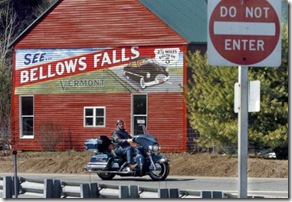A couple of weeks ago, I saw an article by Meredith Goldstein in The Boston Globe on what constitutes a "young person" from a professional networking point of view.
As it happens, young professional associations nationwide are experiencing an increase in folks over the age of 40 who consider themselves young professionals.
In the case of the Boston Young Professionals Association, and some other like organizations, the magic number is 45.
Others are sticking to their guns, and defining their cut off age as 40.
One group in Hartford is throwing a sop to the plus-40 brigade, and will be running "young at heart" functions. Which I can't imagine any self-respecting person under the age of 80 attending. Maybe if it were called twenty- or thirty-something at heart.
But "young at heart"?
Shades of someone's 70 year old son karaoke-ing Frank Sinatra on the occasion of his mother's 100 birthday. ("Fairy tales can come true. It can happen to you. If you're young at heart....And if you should survive to 105. Think of all you'll derive, just by being alive." The words are fresh in my mind because I'm just off a long driving haul to Syracuse, and I have some Frankie boy on my iPod.)
Back to the young professionals, it seems that the definition of young is becoming more and more elastic, and, in many people's eyes, includes anyone in their 40's who's not married. Which can and does, of course, lead to some unseemly networking events in which the newly divorced 40-something wants to see if he really can trade a forty for two twenties.
There are, of course, no reason why people across a wide age range shouldn't be doing professional networking. Most of my work comes through my network. And most of my network is younger than I am.
And there's no reason why people across a wide age range can't be socializing.
At the wedding I went to last week, I had a great time talking with the bride and groom and their friends, all in their mid-late twenties. All interesting and intelligent. None of whom appeared eye-rollingly bored out of their skulls to be in the presence of someone in her 50's. Of course, this was a social occasion, but not a social networking occasion. I really think that, when it comes to social-socializing - in which people are looking to make romantic connections, or even just get picked up - people in their twenties and thirties should be able to operate without having to worry about 40- and 50- and 60-somethings hounding around them.
(And most 40-, 50- and 60-somethings I know have no interest whatsoever in social socializing with people who look great, dress hip, like that kind of music (at that decibel level), are really deft texters, can hold their liquor really well, have more adventures (and misadventures) ahead of them, and don't yet have a clue about their own immortality. A little of that goes a long way, baby.)
What pushing the upward limits of what constitutes a "young professional" tells me is that a lot of us just can't accept the fact that we're getting older.
Older keeps getting younger. (Or is it that younger keeps getting older? I'm addled and confused!)
All those nips, tucks, and dye jobs; all that Botox and Viagra - ain't nothing going to keep us forever young, let alone forever alive.
I consider myself relatively youthful in appearance and attitude. For my youthful appearance, I credit my mother's skin and my hair colorist, Rita. For my youthful attitude, I'll credit my interest - for all my grumping and grousing - in new things, new ideas, new writers, new music (within reason), new places, and new people.
But it's all relative, isn't it?
Compared to someone in her 20's or 30's, I'm an old professional, not a young professional.
And I don't think it makes any sense to say that "age doesn't matter."
It does and it doesn't.
Age - in either direction - shouldn't be used as an excuse to discount someone's worth or opinion.
But when it comes to defining "young", I just don't see 45 fitting the definition.
Maybe that's because I'm just a jealous old crone in my fifties who ain't no one going to let into the young professionals club.
Oh, boo-hoo.

